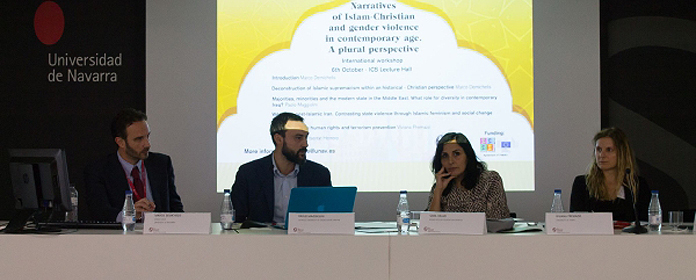"Islamic radicalization is more than a symptom of the failure of integration policies," an Italian researcher argues
Viviana Premazzi argued for promoting the recognition of immigrants as active members of the community at the ICS of the University of Navarra

FOTO: María Jesús Ruiz
"Islamic radicalization is more than a symptom of the failure of integration policies," or so argued Viviana Premazzi, a researcher in the Department of Cultures, Politics and Society at the University of Turin (Italy). Her remarks were given at the University of Navarra as part of an event organized by Marco Demichelis, a Marie Curie research fellow working at the Institute for Culture and Society (ICS).
"Radicalization is a complex process," she argued and continued, "Its causes are very heterogeneous and include the search for identity and resentment due to discrimination and economic disadvantages.”
In order to "counteract the development of reactive identities and destructive attitudes against society," the expert advocated for "the social inclusion of immigrants and their descendants, Muslims and non-Muslims, recognizing them as active- and not just problematic- members of a community, with rights and duties, and with the same opportunities."
Second-generation immigrantsShe indicated that her country, Italy, tried to advance along this line with a citizenship law, but it has been stalled since 2015. As a consequence, this stagnation "is leading to the development of reactive tensions and attitudes on the part of second-generation immigrants, who although they perceive themselves as 100% Italian, are still treated as Italians with residence permits," she lamented. "Reform," she stressed, "is increasingly necessary and will benefit almost one million young people."
In addition to Premazzi’s contribution, the seminar included presentations by Sara Hejazi, a researcher in the Department of Religious Studies at the Bruno Kessler Foundation, who focused on state violence against women in contemporary Iran, Marco Demichelis, who analyzed Jihad in first-century of Islam, and Paolo Maria Leo Cesare Maggiolini, a researcher and professor of Islamic Asian History at the Catholic University of the Sacred Heart, who spoke about Christians’ experiences during the Saddam era in Iraq.
